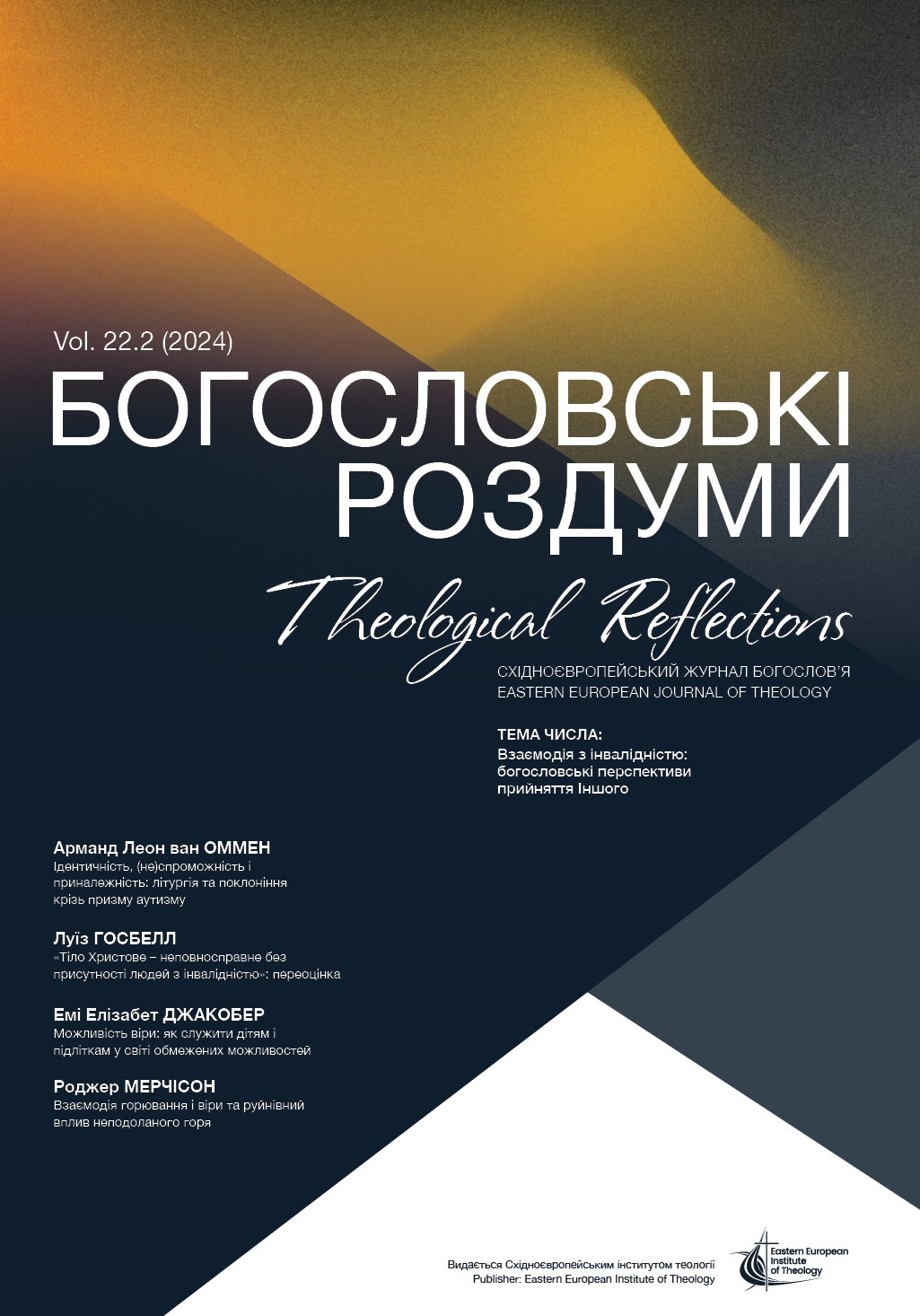The Grief/Faith Relationship and the Disabling Effect of Unresolved Grief
DOI:
https://doi.org/10.29357/2789-1577.2024.22.2.5Keywords:
faith and grief relationship, Christian praxis, the Bible and grief, reframing grief, individual lament, national lament, theodicy, free willAbstract
The emotional trauma of grief can be disabling. The Biblical story of Ruth and Naomi is a metaphor for better understanding the relationship between grief and faith. The grief/faith relationship will be examined from several different points of view. This article will explore the theory and hypothesis of whether or not a person involved in an active Christian life will experience a strengthening of their faith because of the grief/faith relationship. The research method used to gain information about the grief/faith relationship was Thomas Groom’s shared Christian praxis. First Baptist Church, Augusta, Georgia (USA) has for 26 years (1998) conducted Grief Ministry Workshops. In these workshops, participants share about their grief/faith story through writing and verbally engaging in group dialogue. The information gathered from these many years of ministering to and consulting with these workshop participants has been very beneficial to examining the influence grief has on faith and faith has on grief. This article will address the Biblical and Theological interpretation of the grief/faith relationship, as well as the Psychological and Sociological dimensions of grief and faith. The concept of Reframing grief will be discussed in detail. Theodicy and Free Will are theological issues that have a major influence of grief. These concepts will be explored as they impact the grief/faith relationship. The article will conclude with a critical analysis of whether or not the shared Christian praxis approach is an effective method in gathering the needed information for a study of the grief/faith relationship
References
- Bowlby, John. Attachment, Vol. 1 of Attachment and Loss NY: Basic Books, 1969.
- Bowlby, John. Attachment, Vol. 111 Loss. NY: Basic Books, 1980.
- Brueggemann, Walter. “Psalms and the Life of Faith: A Suggested Typology of Function.” Journal for The Study of the Old Testament Vol. 17, June 1980.
- Brueggemann, Walter. “The Formfulness of Grief.” Interpretation Vol. 31, July 1977.
- Brueggemann, Walter. “Will Our Faith Have Children?” Word & World 3/3, 1983.
- Capps, Donald. Reframing, A New Method in Pastoral Care. Minneapolis: Fortress Press, 1990.
- Cobb, Keith D. The Grief Survival Handbook. Victoria: Trafford Publishing, 2009.
- Davidson, Glen. Understanding Mourning. Minneapolis: Augsburg, 1987.
- Depoortere, Katelijne. I Don’t Want You to Die. Bruges: Van Driel Publishing, 2020.
- Gilkey, Langdon. Naming the Whirlwind. Indianapolis: Bobbs-Merrill Co., 1969.
- Groome, Thomas H. “Praxis.” In Harper’s Encyclopedia of Religious Education. Ed. Iris V. Cully and Kendig Brubaker Cully. San Francisco: Harper & Row, 1990.
- Groome, Thomas H. Christian Religious Education: Sharing Our Story and Vision. San Francisco: Jossey-Bass, 1999.
- Hull, William E. Harbingers of Hope. Birmingham: Samford University Press, 2014.
- James, John, and Cherry, Frank. The Grief Handbook: A Step-by-Step Program for Moving Beyond Loss. New York: Harper & Row, 1988.
- James, John, Russel Friedman. The Grief Recovery Handbook, 20th Anniversary Expanded Edition: The Action Program for Moving Beyond Death, Divorce, and Other Losses. NY: William Morrow Paperbacks, 2017.
- Kübler-Ross, Elizabeth. On Death and Dying: What the Dying Have to Teach Doctors, Nurses, Clergy and Their Own Families (50th Anniversary). NY: Scribner, 2014.
- Kübler-Ross, Elizabeth. On Death and Dying. London: The MacMillian Company,1969.
- Kushner, Harold. When Bad Things Happen to Good People. NY: Anchor Book Press, 2004.
- Lane, Belden. The Solace of Fierce Landscapes. Oxford University Press, 1998.
- Lewis, C. S. A Grief Observed. London: Faber and Faber, 1961.
- Longsworth, William. “Kierkegaard and Pastoral Care.” The Perkins School of Theology, 1983.
- Marty, Marty E. A Cry of Absence: Reflection for the Winter of the Heart. Eugene, OR: Wipf and Stock, 2009.
- Mowinckel, Sigmund. The Psalms in Israel’s Worship. Vol. 1. Oxford: Basil Blackwell, 1962.
- Murchison, Rodger. “When The Grief-Stricken Get Grief-Stuck.” Leadership, Spring 2003.
- Murchison, Rodger. Guide for Grief. Michigan: Read the Spirit Books, 2011.
- O’Hear, Anthony. “Mourning and Memory, Private and Public Dimensions.” In The Meaning of Mourning: Perspectives on Death, Loss, and Grief. Edited by Mikolaj Slawkowski-Rode (Lanham: Lexington Books, 2023).
- Switzer, David K. “Awareness of Unresolved Grief: An Opportunity for Ministry.” The Christian Ministry, Vol. 11, July 1980.
- Weatherhead, Leslie D. The Will of God. Nashville: Abingdon Press 1954.
- Westberg, Granger E. Good Grief. Minneapolis: Fortress Press, 2018.
- Westerhoff, John. Will Our Children Have Faith? New York: Seabury, 1976.
- Westermann, Claus. The Role of the Lament in the Theology of the Old Testament. Interpretation Vol. 28, 1974.
- Wolfelt, Alan D. Understanding Your Grief. Fort Collins: Companion Press, 2021.
- Wolterstorff, Nicholas. “Living with Grief.” In In This World of Wonders: Memoir of a Life in Learning (Grand Rapids: Eerdmans, 2019).
Downloads
Published
How to Cite
Issue
Section
License
Copyright (c) 2024 Rodger Murchison

This work is licensed under a Creative Commons Attribution-NonCommercial 4.0 International License.
All articles published in the Journal are distributed under a Creative Commons Attribution-NonCommercial 4.0 International License
By submitting an article for publication in Theological Reflections: Eastern European Journal of Theology the author grants the editors the right to publish the article and distribute it in electronic and print form.
The author reserves all copyrights and the right to use the materials of the article in whole or in part for educational purposes, to write his own dissertations, to prepare abstracts, conference reports, oral presentations, etc., as well as post electronic copies of articles (including the final electronic version downloaded from the journal’s official website) on non-commercial web-resources without the consent of the editorial board and founders.



